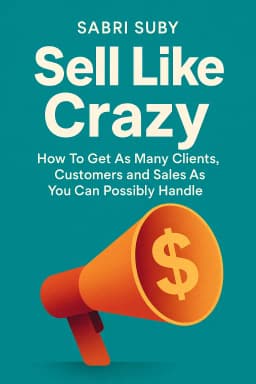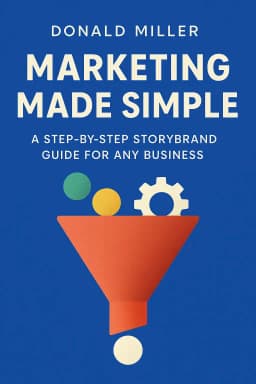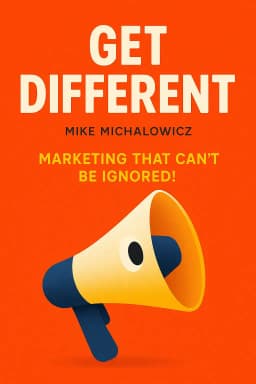
The Dangerous Idea of Permission
Turning Strangers into Friends, and Friends into Customers
Golden Hook & Introduction
SECTION
Olivia: The average American is hit with about 3,000 marketing messages a day. That's roughly one million a year. The shocking part? You probably don't remember a single one from yesterday. Today, we explore why that system is broken, and what replaces it. Jackson: A million ads a year? That explains why my brain feels like a browser with way too many tabs open. It’s just constant, overwhelming noise. I can’t imagine how anyone cuts through that. Olivia: Exactly. And that noise is the central problem Seth Godin tackled in his groundbreaking 1999 book, Permission Marketing: Turning Strangers into Friends, and Friends into Customers. What's wild is that his ideas were so radical at the time, he was actually expelled from the Direct Marketing Association for proposing them. Jackson: Kicked out? For suggesting a better way to market? Okay, now I'm hooked. What was so dangerous about his idea? Olivia: The dangerous idea was his diagnosis of the problem itself. He gave it a name that perfectly captures that feeling you just described: Interruption Marketing.
The Death of Interruption: Why Your Attention is Under Siege
SECTION
Jackson: Interruption Marketing. That’s just a fancy term for every annoying ad I see, right? The pop-ups, the unskippable YouTube commercials, the billboard that distracts me when I’m driving. Olivia: Precisely. For about a century, that was the only game in town. The core function of all those ads is to interrupt what you’re doing to demand your attention. Godin uses this brilliant analogy to show why it’s failing. Imagine you’re at the airport early in the morning. It’s quiet, you’re relaxed. Someone comes up and asks for directions. You’d probably be happy to help, right? Jackson: Yeah, of course. It’s a nice, simple human interaction. Olivia: Now, picture the same airport at 5 PM. It’s chaotic, you’re late for your flight, your kids are screaming, and you’ve already been stopped by five different people asking for money or trying to sell you something. The same person asks for directions. How do you feel now? Jackson: Oh, I’ve been that person in the crowded airport. You put your head down, you avoid eye contact, you just want to get away. The request itself isn't bad, but the context makes it an unbearable interruption. Olivia: That’s the crisis of modern advertising in a nutshell. We’re all living in that 5 PM airport, all the time. We’re so bombarded with messages that our only coping mechanism is to ignore almost all of them. It’s not our fault; it’s a system that has pushed us to our limits. Jackson: But isn't that just the cost of doing business? Companies have to advertise to survive. They have to interrupt us to get their message out. Olivia: That’s the conventional wisdom Godin attacks. He argues it's a vicious cycle. As we pay less attention, marketers get desperate. They shout louder, create more shocking or entertaining ads, and interrupt us in more and more invasive ways. As he puts it, "To surmount the profusion of advertising... they have decided to redouble their interruptions!" Jackson: So they’re trying to solve the problem of too much noise by making more noise. That sounds… unsustainable. Olivia: It is. And it’s incredibly wasteful. Think about the evolution of television. In the 1960s, there were three channels. An ad for Crisco or Ivory soap was a shared cultural event. Everyone saw it, everyone talked about it. Today, with hundreds of channels and infinite streaming services, that mass market is dead. It’s been replaced by what Godin calls "targeted markets." Jackson: Right, the market is fragmented into a million tiny pieces. So a Super Bowl ad, which costs millions, is basically a desperate attempt to recreate that old feeling of a shared moment, but for most products, it’s just not possible anymore. Olivia: Exactly. The money is spent, but the attention isn't guaranteed. The interruption model is based on a world that no longer exists. It’s like trying to navigate a modern city with a map from 1950. You’re going to get lost, and you’re going to get frustrated. Jackson: Okay, so the diagnosis is clear: Interruption Marketing is a zombie. It’s still walking around, but it’s basically dead. What’s the cure? Olivia: The cure is the big, controversial idea that got him in trouble. It’s a complete reversal of the logic.
The Permission Mindset: From Stranger to Friend to Customer
SECTION
Olivia: Godin argues the solution isn't to shout louder, but to change the conversation entirely. It’s a shift from hunting to farming. Instead of chasing down strangers and yelling at them, you cultivate a relationship with people who actually want to hear from you. This is Permission Marketing. Jackson: Permission. It sounds so simple, almost obvious. Just ask first. Olivia: It is simple in concept, but radical in practice. Godin says for marketing to be effective today, it must be three things: anticipated, personal, and relevant. The consumer has to look forward to it, it has to be tailored to them, and it has to matter to them in that moment. Jackson: That sounds like the exact opposite of every credit card offer I get in the mail. Olivia: It is. He uses another fantastic analogy: the marriage analogy. Interruption Marketing is like going to a singles bar, walking up to the first person you see, and proposing marriage on the spot. It’s aggressive, it’s impersonal, and your odds of success are basically zero. Jackson: That's brilliant. One is creepy and desperate, the other is natural and builds over time. You’re not trying to close a deal on the first interaction. Olivia: Exactly. Permission Marketing is like going on a first date. Then a second. You get to know each other. You build trust. You learn what the other person wants and needs. The "sale" or the "marriage proposal" only comes after a real relationship has been established. You’ve earned the right to make the offer. Jackson: I love that. It reframes marketing from a transaction to a relationship. But what does that look like in the real world? It sounds nice, but maybe a bit idealistic for a big company. Olivia: Well, Godin gives one of the most profitable examples in history, and it's incredibly simple. The phrase: "With fries, sir?" Jackson: Wait, that’s Permission Marketing? Olivia: It’s a perfect, micro-level example of what he calls Situational Permission. The customer is already engaged in a transaction with you. They’ve given you their attention. In that moment, you have their permission to offer something relevant and personal. You’re not calling them at home during dinner to ask if they want fries. You’re offering it at the exact moment it makes sense. It’s a multi-billion dollar phrase built on that tiny moment of permission. Jackson: That makes so much sense. The context is everything. But that’s a small upsell. Can this work for bigger, more complex sales? Olivia: Absolutely. And it doesn't have to be high-tech. Godin tells the story of Joe Girard, who is in the Guinness Book of World Records as the greatest car salesman ever. He sold ten times more cars than the average salesman. Jackson: Okay, what was his secret? A slick sales pitch? Aggressive tactics? Olivia: The opposite. His entire system was built on low-tech Permission Marketing. Every year, he sent ten personal cards to every single one of his prospects and customers. Birthday cards, holiday cards, simple "thinking of you" notes. That’s it. Jackson: Just greeting cards? Olivia: Just greeting cards. It cost him very little, but the effect was profound. He wasn't interrupting them with a sales pitch. He was consistently and personally reminding them that he cared about them as people. He was turning strangers into friends. So when they, or someone they knew, needed a car, who was the first person they thought of? Jackson: Joe. The guy who remembered their birthday. They weren't just customers; they were part of his community. He had their permission to be top-of-mind. Olivia: Precisely. He built a permission asset. And that asset generated trust, which in turn generated sales and referrals. It’s a fundamentally more human and, as it turns out, more profitable way to do business. Jackson: Okay, so building a relationship makes sense. But it still sounds a bit… fuzzy. Is there a system to it? How do you go from a simple greeting card to, say, a multi-million dollar business partnership? Olivia: There is. Godin breaks it down into a clear framework, which he calls the five levels of permission. It’s like a ladder of trust you invite the customer to climb with you.
The Ladder of Trust: Climbing the Five Levels of Permission
SECTION
Olivia: The five levels are Situational, Brand Trust, Personal Relationships, Points-Based, and the highest level, Intravenous. Each step up the ladder represents more trust, more responsibility for the marketer, and more profit. Jackson: Intravenous? That sounds intense. Like you’re literally injecting the product into their veins. Olivia: It’s not far off! Intravenous permission is when the customer trusts you so much that they delegate purchasing decisions to you. You are authorized to act on their behalf, automatically. It’s the ultimate level of trust. Jackson: Wow. Does that even exist in the real world? Olivia: It does, and it’s incredibly powerful. A classic example is the partnership between Procter & Gamble and Wal-Mart. P&G has direct access to Wal-Mart’s sales data for Tide detergent. They monitor the inventory levels in every store, and when a store is running low, P&G automatically ships more Tide. Wal-Mart doesn't even place an order. Jackson: Wait, so Wal-Mart just lets P&G decide how much soap to send them? That's an insane level of trust! They’ve completely outsourced that part of their business to their supplier. Olivia: Exactly. Wal-Mart has given P&G intravenous permission because it saves them time, money, and prevents stock-outs. P&G, in return, gets guaranteed sales and a frictionless supply chain. It’s a win-win built on the highest possible level of trust. But this level also comes with immense risk. Jackson: I was just about to ask. What happens when that trust is broken? Because that feels like a long way to fall. Olivia: It can be destroyed in an instant. Godin tells a personal story about his local framing shop. He was a loyal customer for years, never questioned the price, because he trusted the owner. He had given the shop a high level of permission. One day, he overheard the owner giving a much better price to a new, price-shopping customer, just to win their business. Jackson: Ouch. So the owner was rewarding the disloyal customer and penalizing the loyal one. Olivia: In that single moment, the trust was shattered. The permission was revoked. Godin went from a loyal, trusting client to a price-conscious shopper who would now compare prices everywhere. The shop owner, in trying to make a quick buck, destroyed a valuable, long-term asset: the customer's permission. Jackson: That’s a powerful lesson. The higher you climb that ladder of trust, the more devastating the fall. It’s not just about getting permission, it’s about cherishing it and proving you deserve it, over and over again. Olivia: That’s the heart of it. It’s not a one-time event; it’s a continuous process. You have to keep providing value to maintain and grow that permission.
Synthesis & Takeaways
SECTION
Olivia: So when you pull it all together, you see this incredible arc. We start in the chaos of the 5 PM airport, overwhelmed by the noise of Interruption Marketing. Then, Godin offers a way out: the simple, human act of asking for permission and building a relationship, whether it’s with a greeting card or a simple question about fries. Jackson: And that relationship isn’t just a fuzzy, feel-good concept. It’s a structured asset that can be measured and grown, all the way up that ladder of trust to a point where a giant like Wal-Mart lets you manage its shelves. Olivia: Exactly. And it forces us to rethink what a business’s most valuable asset truly is. It’s not the factory, it’s not the patents, it’s not even the brand name in the abstract. In a world of infinite noise, the most valuable asset is a list of people who want to hear from you. That permission is the real currency. Jackson: So really, this applies to more than just business. It's about how we communicate in general—in our jobs, in our relationships. It’s about earning the right to have a conversation, rather than just demanding to be heard. It’s a shift from broadcasting to connecting. Olivia: That’s a perfect way to put it. It’s a fundamental change in mindset. And once you see it, you can’t unsee it. Jackson: I’m already thinking about all the spam emails I’m going to delete with a newfound sense of purpose. Olivia: Here’s a challenge for our listeners. Just for today, notice every time a brand tries to interrupt you versus when one tries to earn your attention. A pop-up ad versus a newsletter you actually signed up for. A cold call versus a follow-up email you requested. The difference is everything. Jackson: I love that. And we’d love to hear about your experiences. Share the most absurd or annoying "interruption" ad you’ve encountered recently. Let’s build a collection of what not to do. Olivia: It’s a powerful reminder that behind every data point is a person, and the most effective way to reach them is to treat them like one. Jackson: This is Aibrary, signing off.









